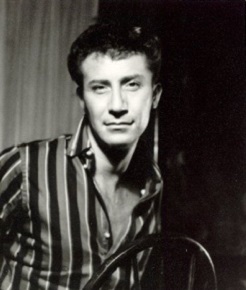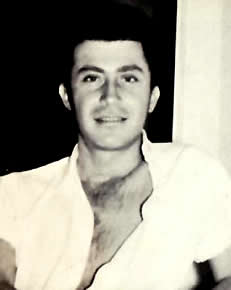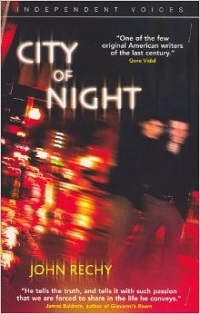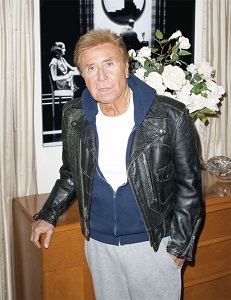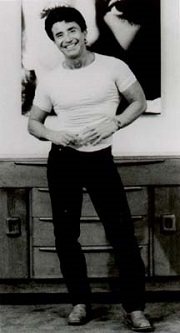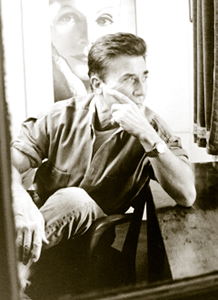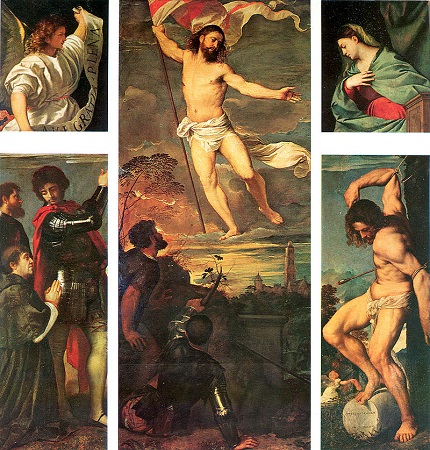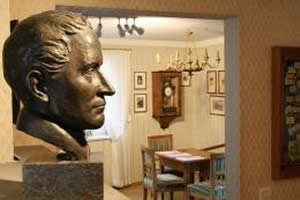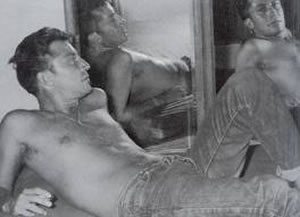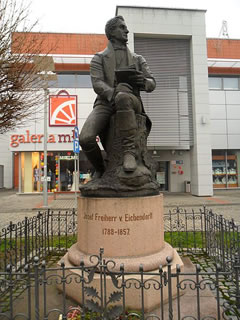De Amerikaanse schrijver John Rechy werd geboren op 10 maart 1934 in El Paso, Texas. Zie ook alle tags voor John Rechy op dit blog.
Uit: Bodies and Souls
“His eyes were just slightly too large for his lean face, but the square jaw compensated for that disparity. Often when he smiled, his whole face was radiant with life. Other times only his lips smiled. He smiled fully now. “Thank you,” Lisa said. She lowered the white-embroidered blouse at the shoulders. Her young breasts vied favorably with those of the sculpted women on the lawn of the rich mansion. Jesse felt a smarting resentment. They had been together two days and one night since Orin had stopped the old, beautiful Cadillac—one of the first of the finned models—to pick him up in the Texas-New Mexico desert. He’d jumped in next to Lisa, delighted by her prettiness. Jesse learned Orin had stopped for Lisa—her brand-new suitcase beside her—just outside Chicago only a few days before that. In their time together, Lisa had never asked Jesse for an opinion. But she asked Orin for permission sometimes. What would Cagney—Cody, Cody Jarrett—what would he do in such a situation? Jesse had discovered Cagney, Cody, and White Heat on television; he saw the movie once again, in a theater, and would have gone back again and again but it played only that day, once. A nervous breeze was becoming warmer. Jesse felt moisture grow under his arms. He opened another button. He wasn’t sure what Orin’s reaction would be if he took off his shirt. There was not a trace of perspiration on Orin, although he wore a light, gray jacket over his white shirt—one button open. His eyes seemed to bore into the mansion, as if to perceive its essence within the scorched gaudy grandeur, the meaning in its disorder. The original house was white. Then a few years ago an Arabian sheik bought it for his pretty teenage bride. He paid two and a half million dollars for it and spent several million more to convert it into the assaulting palace. It was painted the color of ripe limes. The nude-colored statues were mounted on the sweeping balustrade. Intrusive trees were cleared so that the house was brazenly open in a section of Los Angeles where other luxurious mansions hide behind walls of dark tall trees. The sheik’s name was engraved on ebony slabs under round mirrors like clashing shields at the gates. Intricate paths and the outlining walls were embedded with brown, amber, ecru stones, smooth and swarthy as the sheik’s skin; iron gray stones, the sheen of burnished silver; and green and purple tiles, dazzling as a peacock’s tail. Under a gleaming copper dome which blazed at sunset, the thirty-eight rooms of the mansion curved in two wings facing iron posts holding lanterns which glowed like haloes of green fire at night.”
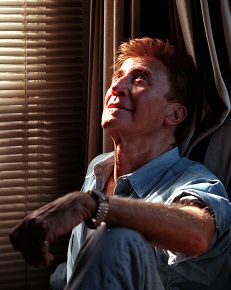
John Rechy (El Paso, 10 maart 1934)
De Vlaamse dichteres Hilde Van Cauteren werd geboren 10 maart 1967 in Hamme. Zie ook alle tags voor Hilde Van Cauteren op dit blog.
ik giet de nacht (sms-gedicht)
ik giet de nacht Oost-Indisch uit een fles
als zwart papier dat wacht op stof van sterren,
van fonkelend gemis, van hier dat zonder ons
geen hier meer is
Tem mij
Tem mij, bind mijn zuchten in,
geef mij een hoepelrok – of neen,
een strak korset – en demp mijn lach.
Leg alles vast vanuit centraal gezag
en tem mij, tem mij als ge kunt.
Probeer het. Er zijn zoveel manieren:
bind mijn voeten in of ring mij, ring
mijn hals met steeds meer ringen.
Verberg mijn haren, snoer mijn middel
stevig aan en sla mijn ogen neer.
Zeg me dat dat mooier is. Bepaal
mijn hele lot, mijn god, hoe kan ik
u bedanken? Want ongetemd bind ik
mijn borsten op tot bolle appels, ring
mijn vingers en leg golven in mijn haar,
laat grote stukken van mijn huid naakt
Het licht opvangen. En ongetemd kijk ik
argeloos in het rond met grote ogen.
Zelfs naar u, terwijl ik vraag: tem mij!
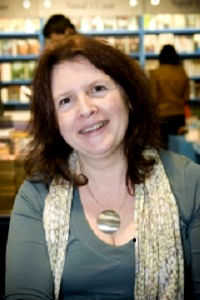
Hilde Van Cauteren (Hamme, 10 maart 1967)
De Duitse dichter en schrijver Joseph von Eichendorff werd op 10 maart 1788 op het slot Lubowitz in Ratibor geboren. Zie ook alle tags voor Joseph von Eichendorff op dit blog.
Sehnsucht
Es schienen so golden die Sterne,
Am Fenster ich einsam stand
Und hörte aus weiter Ferne
Ein Posthorn im stillen Land.
Das Herz mir im Leib entbrennte,
Da hab’ ich mir heimlich gedacht:
Ach wer da mitreisen könnte
In der prächtigen Sommernacht!
Zwei junge Gesellen gingen
Vorüber am Bergeshang,
Ich hörte im Wandern sie singen
Die stille Gegend entlang:
Von schwindelnden Felsenschlüften,
Wo die Wälder rauschen so sacht,
Von Quellen, die von den Klüften
Sich stürzen in die Waldesnacht.
Sie sangen von Marmorbildern,
Von Gärten, die über’m Gestein
In dämmernden Lauben verwildern,
Palästen im Mondenschein,
Wo die Mädchen am Fenster lauschen,
Wann der Lauten Klang erwacht,
Und die Brunnen verschlafen rauschen
In der prächtigen Sommernacht. –
Die Nachtblume
Nacht ist wie ein stilles Meer,
Lust und Leid und Liebesklagen
Kommen so verworren her
In dem linden Wellenschlagen.
Wünsche wie die Wolken sind,
Schiffen durch die stillen Räume,
Wer erkennt im lauen Wind,
Ob’s Gedanken oder Träume? –
Schließ ich nun auch Herz und Mund,
Die so gern den Sternen klagen:
Leise doch im Herzensgrund
Bleibt das linde Wellenschlagen.
Heimweh
Wer in die Fremde will wandern,
Der muß mit der Liebsten gehn,
Es jubeln und lassen die andern
Den Fremden alleine stehn.
Was wisset ihr, dunkele Wipfel,
Von der alten, schönen Zeit?
Ach, die Heimat hinter den Gipfeln,
Wie liegt sie von hier so weit!
Am liebsten betracht ich die Sterne,
Die schienen, wie ich ging zu ihr,
Die Nachtigall hör ich so gerne,
Sie sang vor der Liebsten Tür.
Der Morgen, das ist meine Freude!
Da steig ich in stiller Stund
Auf den höchsten Berg in die Weite,
Grüß dich, Deutschland, aus Herzensgrund!
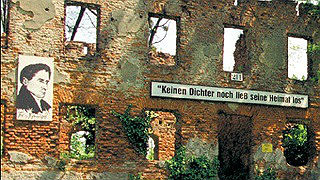
Joseph von Eichendorff (10 maart 1788 – 26 november 1857)
De ruine van Schloss Lubowitz in Ratibor
De Duitse schrijver Jakob Wassermann werd geboren op 10 maart 1873 in Fürth. Zie ook alle tags voor Jakob Wassermann op dit blog.
Uit: Alexander in Babylon
„Charmides, einer der jüngsten Edelknaben, saß eingesunken auf seiner nysäischen Stute, die Knie wie im Krampf emporgezogen, die Augen geschlossen. Bisweilen tastete er wie ein Schlafender über den Hals des Tieres hinaus, als suche er seine Gefährten. Doch viele waren schon dahin: der blondgelockte Philippides, den eine indische Sklavin so verzaubert hatte, daß er ihretwegen die fremden Götter anbetete; Medon, von Alexander besonders geliebt wegen seiner Tapferkeit; Himeneus, der schönste Jüngling aus Pella, Amphinomos, der Liebling des Leibwächters Ptolemäos. Die Sonne hatte sie getötet, der Sand begraben.
Wie still war es geworden, daß selbst kein Stöhnen mehr zum Ohr drang. In dumpfem Schmerz die Augen öffnend, sah sich Charmides plötzlich allein. Das ganze Heer schien vom Erdboden eingesogen zu sein. Rötlichschwarze Luft zitterte um ihn, sein Kopf war weit in den Nacken gebeugt, wie nach rückwärts abgebrochen. Schon stockte ihm das Herz. Die Haut des ganzen Körpers war aufgequollen. Da ertönte eine Stimme, schauerlicher als die des Hierophanten bei den Mysterien. War es die eines Gottes, die eines Sterbenden? Das gänzlich erschöpfte Pferd wankte noch einmal nach vorwärts, dann blieb es, als seien die Sehnen seiner Knie zerschnitten, jäh an einen spitzen Felsen gelehnt stehen. Der blutige Schaum tropfte hörbar aus seinem Maul auf den Boden. Seine Haut erzitterte, dann rührte es sich nicht mehr. Im Stehen verendete es, erstarrte es.
Charmides ließ sich herabgleiten. Er wollte rufen. Indem er den Mund öffnete, bemerkte er mit namenlosem Entsetzen, daß die Luft auf seinen Lippen keinen Klang gab. Er warf seine Arme über den Rücken des Pferdes und legte die Stirn auf die noch dampfende Weiche. Ein letztes Bild sah sein innerlich brechendes Auge: die rosig goldenen Hügel am Strand von Ambrakia, dort wo die Heimat war.“

Jakob Wassermann (10 maart 1873 – 1 januari 1934)
Cover
De Vlaamse dichter en schrijver Karel van de Woestijne werd geboren te Gent op 10 maart 1878. Zie ook alle tags voor Karel van de Woestijne op dit blog.
O God, ik heb de geur der vlieren om me henen
O God, ik heb de geur der vlieren om me henen,
en mijn hart – God, gij kent zijn lijden, en Ge weet
hoe vaak het, schoon gelate’, in pijn zijn dagen leed -,
is als een appel-boom, met pralend licht omschenen,
die blij zijn branken breidt, waar roze en blank verenen
hun perel-kleuren in ’t teer weemlend bloemen-kleed…
Zo is mijn vrucht-zwaar hart een vreugde-boom, en breed
is om zijn kruin de vlieren-geur’ge dag verschenen.
O God, die glanzend thans van aangezichte zijt
bij deze zomer-dag vol rechte honig-geuren;
Gij, die Uw rijke hand ter zegeninge breidt
en mij naar ’t hel gelaat des zomers ’t hoofd liet beuren,
– o God, maak mijne dage’ éen dag als dezen, wijd
gelijk een groot paleis met zonnig-open deuren…
Ik ben de hazel-noot
Ik ben de hazel-noot. – Een bleke, weke made
bewoont mijn kamer, en die blind is, en die knaagt.
Ik ben die van mijn zaad een duisternis verzade.
En ‘k word een leêgt’, die klaagt noch vraagt.
‘k Verlaat me-zelf; ‘k lijd aan me-zelven ijle schade.
Ik ben ’t aanhoudend maal, in een gesloten kring,
van ene domme, duldeloze, ondankb’re made.
Maar raak’ de vinger van een kind me, dat me rade:
hij hoort mijn holte; ik luid; ik zing.
De stille zonne daar ik zit
De stille zonne daar ik zit, voor mijne woning,
in de oude lijste van een groene en rode veil;
van al de bloemen op mijn mond de milde honing,
en in mijn hart van al de dagen ’t vrome heil;
een witte roze aan mijne krage, en voor mijne ogen
de weiden en de Leië in lage zonne-brand;
van mijne vrouwe in mij het zorgend mededogen,
en van mijn zoontje op mijne wang de koele hand;
– ik voel een rijpe traan diep uit mijn binnenst rijzen
van verre heimwee en gevréesd geluk, misschien;
‘k laat op mijn moede oog de lange wimpers dijzen;
– maar als ik ze open, zult ge er zonnen stralen zien…
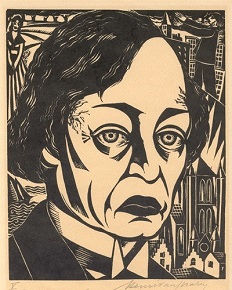
Karel van de Woestijne (10 maart 1878 – 24 augustus 1929)
Portret door Henri van Straten, 1937
De Franse schrijfster en performance artieste Chloé Delaume werd geboren als Nathalie Dalain op 10 maart 1973 in Parijs. Zie ook alle tags voor Cloé Delaume op dit blog
Uit: Des jeunes modernes (Orphan Twist)
« Je suis Yves Adrien qui apprend la mort de Sid Vicious. Je suis la place de la Concorde envahie par un million de spectateurs pour le concert de Jean-Michel Jarre. Je suis donc un record mondial mais je n’aime pas trop m’en venter. Je suis l’inauguration du Forum des Halles par le maire de Paris, Jacques Chirac. Je suis l’ouverture à Strasbourg du premier de Mac Donald’s en France. Je suis le suicide du sociologue marxiste Nikos Poulantzas. Je suis l’assassinat de Pierre Goldman revendiqué par Honneur de la Police. Je suis l’affaire des diamants de Bokassa et les chargeurs vidés dans le corps de Mesrine. Je suis la renaissance du magazine Actuel. Je suis 1979, la voix de Jean-François Bizot : les années 80 seront actives, technologiques et gaies. Je suis l’avènement au pouvoir de Margaret Thatcher, et je suis le dollar qui tombe à quatre francs.
Wänx n’était qu’une machine, mais je la regardais comme aucun homme ne regarda jamais une femme. Je suis Anne qui cherchait l’amour dans les riffs sombres de Donatien. Je suis la première édition des Rencontres Transmusicales de Rennes. Je suis encore avant octobre, je ne suis pas encore mythomane, je suis déjà un artefact, je suis un amour de dessert. Wänx n’était qu’une machine, mais je la regardais comme aucun homme ne regarda jamais une femme. Je suis la môme kaléidoscope, je suis Mannequin dans la vitrine, je porte en mon sein l’Ombre jaune, mon âme est un palace, mon cœur est rose bonbon. Ce qui s’irradie du jukebox pendant que Pia et Arja meurent, à l’infini, au creux de moi, c’est un séisme acidulé qui s’achèvera longtemps après, doux comme un naufrage en hiver. Je suis l’orée d’une nouvelle ère et toute une époque mise en scène. Je suis Neü, New, Novö : 250 mg de modernité.
Pia et Arja posent en confiance. Elles savent combien les flashs sont aussi beaux qu’une balle. Elles sont déjà prêtresses des médiatisations. Le démon et l’ange chapeauté, hôtesses de nuit ou d’un drôle d’air qui déjà était corrodé. Je n’ai eu le temps de t’aimer. Elles sont toutes les deux gantées. Il n’y a rien à faire oublier. Les gants ornementaux datent en Europe du XIIIe siècle.”
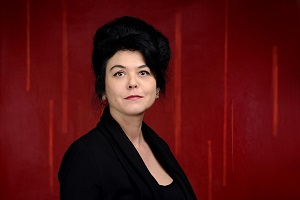
Chloé Delaume (Parijs, 10 maart 1973)
De Duitse dichter, vertaler en filosoof Karl Wilhelm Friedrich von Schlegel werd geboren op 10 maart 1772 in Hannover. Zie ook alle tags voor Friedrich Schlegel op dit blog.
Calderon
Ein Zaubergarten liegt im Meeresgrunde;
Kein Garten, nein, aus künstlichen Krystallen
Ein Wunderschloß, wo blitzend von Metallen,
Die Bäumchen sprossen aus dem lichten Grunde;
Kein Meer, wo oben, seitwärts, in die Runde,
Farbige Flammenwogen uns umwallen,
Doch kühlend, duftend alle Sinne allen
Entrauben, süß umspielend jede Wunde.
Nicht Zaub′rer bloß von diesen Seligkeiten,
Bezaubert selbst wohnet, zum schönsten Lohne,
Im eignen Garten selig selbst der Meister;
Drum sollen alle Feen auch bereiten
Des Dichterhimmels diamantne Krone,
Dir, Calderon! du Sonnenstrahl der Geister.
Der welke Kranz
Es war noch Mai, da hast du sie gebrochen,
In Blumen ausgesprochen, selber Blüte,
Was blühend im Gemüte schon sich regte,
Und heilig sich bewegte,
Was kindlich ach! der Freund so gerne hegte,
Wenn sie ihr Herzchen legte an das seine,
Wo ich nun ewig weine.
Die Veilchen sandte mir das Kind zum Zeichen,
Die so mein Herz erweichen, daß die Augen
Den Schmerz, den sie nun saugen, nie vollenden,
Sich oft noch zu ihr wenden,
Und finden welk den Kranz dann in den Händen.
Wie der, hat sie zu enden früh erkoren,
Sich unbewußt verloren.
Nimm hin die hohe köstlich liebe Gabe,
Das einz’ge, was ich habe von der Teuern,
Ihr Bild mir zu erneuern, wenn in Tränen,
Dem Tode zu das Sehnen
So gern entflieht der Erde eitlem Wähnen.
Doch erst laß mich in Tränen ganz versenken
Das süße Angedenken!
Uns, die in Lust des Todes Leben fanden,
Kühn die Natur verstanden in den Flammen,
Wo Lieb’ und Schmerz zusammen uns verbunden;
Uns sei die Stirn umwunden,
Vom Zeichen, dessen Sinn wir längst gefunden.
Denn sproßten aus den Wunden oft nicht Rosen,
Uns schmerzlich liebzukosen?
Laß denn des Mädchens Schatten uns umschweben,
Der Wehmut hingegeben,
Bis wir im Tode Eins noch inn’ger leben,
Und dann dies tiefe Streben ganz vereinet,
Das lächelnd sich beweinet.
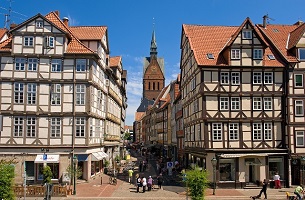
Friedrich von Schlegel (10 maart 1772 – 11 januari 1829)
Hannover, centrum
Zie voor nog meer schrijvers van de 10e maart ook mijn vorige blog van vandaag.
Zie voor bovenstaande schrijvers ook mijn blog van 10 maart 2007 en ook mijn blog van 10 maart 2008 en eveneens mijn blog van 10 maart 2009.

